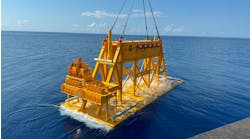On April 21, 2010, after learning of the tragicDeepwater Horizon accident the prior night, everyone realized that the offshore world would change. What no one knew was just how much it would change. Two years after that fateful spring evening, the offshore petroleum industry is just beginning to comprehend the full regulatory impact. The industry's problem is that many rules can now be made by regulators without the counsel of those subject to the regulations. This portends hidden costs and big risks for service companies.
This new offshore regulatory environment emerged from the heightened scrutiny of companies and workers by the federal government's new enforcement agencies. The comfortable regulatory regime that existed for decades with the Minerals Management Service (MMS) has been replaced by stricter safety standards and more rigid equipment requirements administered by two separate agencies. For service companies, their black swan may already be swimming in the water in the form of regulatory action by the Bureau of Safety and Environmental Enforcement (BSEE).
It all started in a speech by Michael Bromwich, then the director of the Bureau of Ocean Energy Management, Regulation and Enforcement (BOEMRE). The speech, which described the agency's plans for the industry, was given at last year's Offshore Technology Conference. "We have completed our review of the issue [of regulation] and have concluded that in fact we have broad legal authority over all activities related to offshore leases, whether engaged in by lessees, operators, or contractors," he said. "We can exercise such authority as we deem appropriate." With little fanfare, the age of service industry regulation was ushered in. The issue remains dormant since BSEE has yet to issue any complaints other than the two associated with the Deepwater Horizon accident, but that does not negate the existence of a regulatory cloud.
The fact that the federal government made its determination without citing any statutory authority should give pause to company managers who remain in the dark about future actions. In addition to the lack of identifiable statutory authority, there is no definition of who is covered, nor are performance standards set forth. The historical offshore regulatory process involved legal agreements between lessees (oil company leaseholders) and the federal government. Under that arrangement, performance standards were spelled out and the process allowing the government to bring a claim for non-compliance was known.
In this new regulatory environment, the lack of authority and definition of standards can lead to revisionary interpretation of actions. We all understand how perfect hindsight is. There is no process for dealing with the government's claims. Thus, there are no limits to the nature or source of a company's exposure; nor are there limits on the extent of the government's reach in extending its jurisdiction. This regulatory situation is the equivalent of driving your car in a town with no speed or warning signs, and then being subjected to the judgment of the traffic officer writing you a ticket.
In March, National Ocean Industries Association (NOIA) President Randall Luthi sent a letter to BSEE director Admiral James Watson, challenging the jurisdiction of the agency to extend regulation to service companies operating offshore. The letter asked the BSEE to respond and "provide detailed and fully supported justification and authority of its announced extension of BSEE jurisdiction beyond federal lessees and their designated operators." BSEE responded in a letter citing the OCS Land Act and implementing regulations for its regulatory jurisdiction. The agency stated, "The ‘any person' language of section 24(b) makes it clear that persons other than lessees and operators can be subject to the Secretary's rules or orders." The agency's response has forced the service industry to either appeal to the Department of the Interior for a ruling or to file a lawsuit. Which course the industry takes is unclear at this time, but it does not alter the message.
For offshore service companies: If you did not know it before, you should understand it now -- your world has changed. You are now subject to regulations you have never experienced before, with all the attendant impact they can have on your company. That means you should assess the impact regulation may have on your operations, insurance coverage and even corporate governance, including regulatory filings for public companies. Companies should consider implementing, or at least reviewing, regulatory compliance programs. Existing service contracts should be reviewed for clarity over risk-sharing and indemnification terms and even pricing arrangements. Public companies also need to consider the adequacy of their business risk disclosure in their filings with the Securities and Exchange Commission.
All of these actions fall under the broad governance umbrella called enterprise risk management and its corollary, risk appetite. Without understanding your new risk situation and assessing just how much risk your company is prepared to assume when entering into an offshore service contract, you risk being subject to Macondo-type damage claims from an accident. To mitigate this potential exposure, service company management needs to understand and help shape the new offshore regulatory scheme. Failure to do so could be the undoing of years of industry success.
Allen Brooks
Managing Director PPHB LP
This page reflects viewpoints on the political, economic, cultural, technological, and environmental issues that shape the future of the petroleum industry. Offshore Magazine invites you to share your thoughts. Email your Beyond the Horizon manuscript to David Paganie at [email protected].
Offshore Articles Archives
View Oil and Gas Articles on PennEnergy.com


